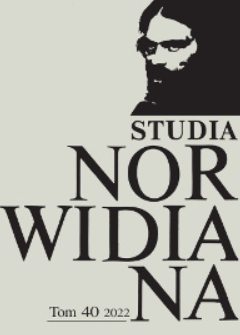IRONIA, CNOTA I „STRACH ŚMIESZNOŚCI” (HERBERT – NORWID)
IRONY, VIRTUE AND “FEAR OF RIDICULE”. (HERBERT – NORWID)
Author(s): Lidia BanowskaContributor(s): Grzegorz Czemiel (Translator)
Subject(s): Comparative Study of Literature, Polish Literature, Theory of Literature
Published by: Towarzystwo Naukowe KUL & Katolicki Uniwersytet Lubelski Jana Pawła II
Keywords: irony; virtue; Cyprian Norwid; Zbigniew Herbert;
Summary/Abstract: The article examines the relationship between irony and virtue in works by Cyprian Norwid and Zbigniew Herbert, arguing that these concepts are crucial for both authors. As such, the article is situated in the area of studies devoted to the presence of the Norwidian tradition in writings by Herbert. His famous poem “Mr. Cogito on Virtue” is a case in point. A close reading of this piece makes it possible to claim that Herbert’s considerations of virtue are modelled on Norwid’s ironic imagination, with irony revealed as one possible incarnation of virtue. Development of images representing the two concepts bases on personification of allegory, made accessible and unique thanks to the de-conventionalizing gesture of anthropomorphism, which causes the images of both female heroines to turn ironic. An important place in these considerations is occupied by the relationship between virtue and irony in a cultural perspective, which is aptly rendered by the metaphor of sisterhood. As the sister of truth, irony is also the sister of virtue. A form of axiological memory, virtue conditions civilizational progress. The irony of the situation diagnosed by both poets consists in the reversal of meanings and values, as a result of which mockery leads to the rejection of the only guarantee of development, while the accompanying fear of ridicule causes most people to refrain from leading virtuous lives, paradoxically foreclosing growth. The relationship between virtue and irony would thus consist in disclosing the improper character of this situation. At the same time, irony is revealed as the answer to today’s lack of virtue brought about by deterioration premised on the rejection of “thinking in terms of values.” Accordingly, the greatest import of the relation between irony and virtue seems to consist in the attempt to restore axiological order.
Journal: Studia Norwidiana
- Issue Year: 2022
- Issue No: 40
- Page Range: 37-56
- Page Count: 20
- Language: Polish

